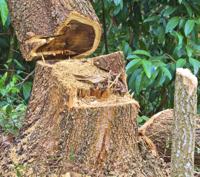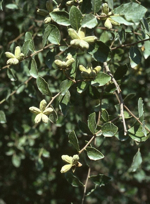In last month’s issue, the first part of SPC’s green chemistry article, ‘Easy being green’, covered improved methods of extracting actives from plants, biotechnology and green process engineering. The focus of part two is on sustainability and fairtrade.
The palm oil problem
Palm oil and its derivatives appeared to be an easy answer to the trend to replace animal fats and petrochemicals in the last quarter of the 20th Century. It needs less than half the land required by other crops such as sunflower, soybean or rapeseed oil to produce the same amount of oil and it is the least expensive vegetable oil in the world. It was then realised just how much environmental damage was being caused to sensitive areas of Asia, Latin America, Indonesia and the Solomon Islands, which were being deforested in order to plant palm trees.
This led to the setting up of the Round Table for Sustainable Palm Oil (RSPO). The first line of its mission statement is “to advance the production, procurement, finance and use of sustainable palm oil products”. Its code of conduct states that “it is fundamental to the integrity, credibility and continued progress of the RSPO that every member supports, promotes and works towards the production, procurement and use of sustainable palm oil”. The RSPO defines sustainable palm oil as that obtained from plantations where no new primary forests or high conservation value areas have been cleared for palm oil production since November 2005. Currently output certified by the RSPO is 9.7 million metric tons, which represents 16% of the world market in palm oil.
For full details of this organisation, its aims and achievements refer to www.rspo.org.
There are various levels of conformance. Identity Preserved (IP) means that certified product is uniquely identifiable to the certified plantation through the whole supply chain. Segregation (SG) ensures that certified sustainable palm oil (CSPO) is kept physically separated from non-certified palm oil but allows blending with other batches of CSPO from different plantations and guarantees that the end product contains only CSPO. Mass Balance (MB) allows products from certified and non-certified sources to be mixed at any stage in the supply chain. Each company handling Mass Balance CSPO is only allowed to sell the same amount of certified palm oil drawn from the ‘mixed’ oils that it originally bought as certified. Finally Book & Claim (B&C), also known as GreenPalm, is a certificate trading system that ensures payment for each certificate goes directly to the producer of CSPO.
A sustainable supply
Ingredient suppliers are very supportive of the RSPO. Cremer Care joined the RSPO in 2007 and was granted the RSPO SCCS supply chain certificate in 2011. It has produced a presentation explaining the environmental and economic benefits of using RSPO certified palm oil over other vegetable oils and now lists fourteen palm oil derivatives with RSPO certification. It is important that the whole supply chain be identified; KemCare is the exclusive distributor for Cremer Care in the UK & Ireland and has recently registered under RSPO SCCS to ensure its customers have a full RSPO SCCS supply chain.

In the last quarter of the 20th Century, palm cultivation led to deforestation in parts of Asia, Latin America and The Solomon Islands
BASF also subscribes to RSPO and markets a range of palm oil derivatives including emulsifiers and surfactants meeting RSPO requirements using either MB or SG systems. BASF states that it is an important step to support more sustainable production of oil palm products and towards fulfilling its commitment to purchase all its palm and palm kernel oil from certified sustainable sources by 2015.
Croda is a significant user of palm oil and a supporter of the RSPO – it also sponsored the annual RSPO Conference held in London in June 2014. By 2015, all of Croda’s manufacturing sites handling palm oil and derivatives will have RSPO Supply Chain Certification and the company is working towards all of their supply chains being certified by 2017.
AAK is one of the founders of the RSPO and also founded and operates the GreenPalm certification programme. The GreenPalm programme allows trading by small producers direct to the palm oil users. Through these activities, AAK continuously contributes to the production of sustainable palm oil. It is also a founding member of the Global Shea Alliance, which is a multi-stakeholder association promoting quality and sustainability in the shea industry. It supports rural African communities and promotes women’s empowerment by strengthening the shea industry and value chain.
Mutual benefit
When sourcing shea kernels in west Africa AAK introduces fairtrade principles and educates rural women in quality improvement. The sourcing of shea kernels includes cooperation with governments and NGOs and AAK believes that proactive work with its supply chains is behind the development of sustainable solutions.
Sustainability and fairtrade were very much keywords at in-cosmetics and they often went together. Fairtrade generally brings to mind poor farmers in Latin America, Africa and the Indian subcontinent. However it also exists in Switzerland. DSM produces its Alpaflor range of bioactives extracted from rare Alpine plants and actively encourages their planting and sustainable harvesting through fairtrade agreements with hill farmers’ cooperatives. In this way it ensures traceability from the seed to the extract and secures its supply and quality.
Premier Specialities is a supplier of fragrances and botanicals and reports that since its inception and incorporation in 1999 it has been committed to a holistic approach to the sourcing and creation of its products. Its botanicals can be traced to the tree or plant from which they came and it can certify those sustainable products originating from Nicaragua and Honduras with the FSC and Rainforest Alliance. It has an extensive list of extracts, oils and butters but Premier also realises that going green applies to more operations than the careful sourcing of ingredients. In a continuing effort to reduce its impact on the environment it constantly documents water, electrical and gas usage, and uses this information to set new goals for the reduction of waste and more efficient water and energy usage in its facilities.

The bark of Quillaja saponaria is a natural surfactant source, but its production has historically been environmentally damaging
Laboratoires Expanscience is a member of the Union for Ethical Biotrade, an international non-profit organisation that works to promote ethical practices in the supply of ingredients sourced from native biodiversity. One of the central aims of this approach is to reduce the social, economic and environmental challenges raised by the plant supply chains in question. An example is its procurement of Acacia macrostachya seeds from Burkina Faso
where they are traditionally used in cooking, medicine and religious ceremonies. In the past they were harvested by women for little reward. Expanscience organised them into local cooperatives, guaranteeing a fair return for properly harvested seeds, which it then uses to prepare its skin hydrating material, Aqualicia, by enzyme hydrolysis.
The bark of Quillaja saponaria trees has long been used as a source of natural surfactant but until relatively recently only the bark was used and the tree left to rot. Over 50,000 trees per annum were being lost in this way until Desert King became involved. Desert King International and its Chilean affiliate, Natural Response, utilise the entire quillaja tree biomass in the production of quillaja extracts and powders. The biomass is obtained by pruning native forests and plantations, utilising branches, bark and limbs, and the number of trees being felled has dropped to 10,000 per year. By removing aged trees and implementing selective branch pruning to improve and promote tree growth, Desert King is stimulating the growth and rejuvenation of native quillaja tree forests.
Desert King also harvests yucca in a sustainable manner, following all the rules and regulations set forth by the Mexican Forestry Department, to ensure that the yucca extraction rate is not more than the plant’s natural recovery rate. All current raw material is obtained from wild harvest, however, Desert King has developed experimental yucca plantations to assure a continued renewable supply for years to come. The majority of materials mentioned in this feature have Ecocert and COSMOS approval.
Author
John Woodruff
www.creative-developemnts.co.uk






